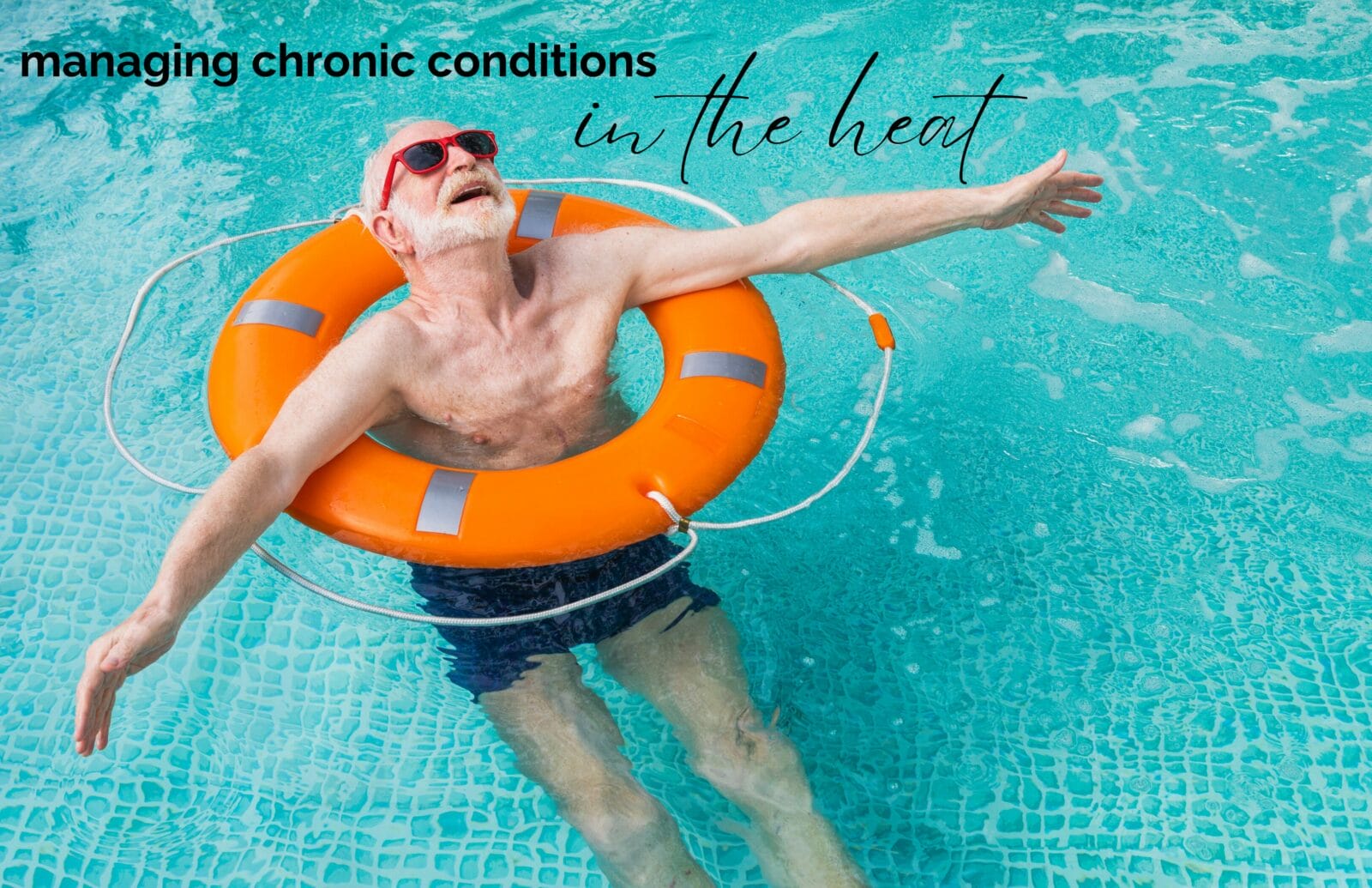While summertime is a fun and exciting time of year, the accompanying heat can pose some challenges for seniors with chronic health conditions. Many health conditions affect your ability to regulate body temperatures, which means that extreme heat could increase your risk of heart attack, respiratory infections, and complications from diabetes. It can also have a negative effect on people with PTSD, mood disorders, or anxiety disorders. (1) However, having a chronic physical or mental health condition doesn’t mean you can’t enjoy the summer, both indoors and out. Keep reading for our senior’s guide to managing chronic conditions in the heat.
The Risks of Heat for Seniors with Chronic Conditions
Heat can worsen some chronic health conditions. For example, people with chronic health conditions might be less likely to notice and respond to changes in temperature. Many medications can worsen the effects of heat as well. This can lead to a higher risk of heat-related illnesses. Some conditions that are affected by heat include:
- Multiple sclerosis. Due to the Uhthoff Phenomenon, an increase in body temperature can make the symptoms of MS worse.
- Lupus or rheumatoid arthritis. The UV rays of direct sunlight can cause flare-ups in symptoms of both of these conditions.
- Diabetes. Heat can make insulin less effective, worsening symptoms of diabetes.
- Dementia. People with dementia are less likely to recognize when they are feeling the effects of heat, which can lead to heat stroke.
- Heart, lung, and kidney disease. High ambient temperatures force your heart, lungs, and kidneys to work harder to maintain your core temperature. This can put you at higher risk of heat intolerance and heat stroke.
Some medications can also put you at higher risk of heat stroke. These medications include anticholinergic agents, which are used to treat conditions like COPD, Parkinson’s, and bradycardia. Beta blockers, which are used to lower blood pressure and treat heart disease, make it harder for your body to regulate temperature. ACE inhibitors, also prescribed for heart diseases, might significantly increase your risk of harm from heat exposure. They also reduce your feeling of thirst, and put you at higher risk for dehydration.
Even if you don’t have chronic conditions, seniors in general are more affected by the heat. For example, decreased sweat production and decreased feelings of thirst can make you more prone to dehydration. While all this can sound scary, it’s completely possible to manage your chronic conditions so that you aren’t negatively affected by summer heat.
Practical Tips for Seniors to Stay Cool
There are many easy ways to stay cool in the summer, whether or not you’re managing chronic conditions. Here are a few practical tips that apply to all seniors, with or without chronic conditions.
- Stay hydrated. Drinking plenty of water or clear liquids helps your organ systems maintain your core temperature. Avoiding caffeine and alcohol will also help, because both have dehydrating effects.
- Wear loose, light-colored clothing that breathes. Keep your dark, heavy, thick clothing for other seasons of the year. In the summer, reach for fabrics that will help keep you cool, like cotton (as long as it’s dry heat, because it isn’t moisture-wicking), bamboo, silk, rayon, viscose, and linen. Stay away from polyester, which is essentially plastic and will cause increased heat and sweating.
- Go outside in the early morning or evening. Avoid the hottest times of the day (typically from about noon to 4 or 5pm, but it depends on your area).
- Use fans to help your sweat evaporate, lowering your body temperature.
- Stay in the shade when possible.
- If you’re near a pool or beach, a dip in the water will definitely cool you down fast.
Managing Common Chronic Health Conditions in the Heat for Seniors
As we previously mentioned, too much heat exposure can be a big problem for those with chronic health conditions. The tips we suggested above apply to all of these conditions, but there are some specific things to be aware of for each condition. Let’s discuss some ways to manage specific chronic conditions in the heat.
Multiple Sclerosis and Heat
Heat can cause an increase of symptoms in many people with multiple sclerosis (MS). Uhthoff’s Phenomenon shows temporary worsening of neurological function in response to heat exposure. If you have MS, pay close attention to your core temperature and take steps to keep yourself from overheating. Cooling products, like cooling towels or neck wraps, are a great thing to take along on any outdoor adventures. You can also try cold water or ice packs on your wrists or back of the neck to help cool you down. If temperatures skyrocket outside, make sure you have an air-conditioned indoor option that’s easily accessible.
Lupus or Arthritis and Heat
For people with lupus or arthritis, the UV rays of direct sunlight can make symptoms worse. Rising temperatures can also cause joint swelling and inflammation. Stay in the shade and avoid being out in the sun for too long to avoid these issues. Lots of cool beverages are another good choice.
Heart Disease and Heat
It’s important to pay attention to the temperature if you have heart disease, because the heat can put extra stress on your heart. Also, talk to your doctor about how the medications you take are affected by the heat. Because of the way blood pressure medicines work, people taking beta blockers or ACE inhibitors are especially at risk for heat exhaustion and stroke. People with heart disease should avoid being outdoors at the hottest part of the day, and take precautions to avoid getting overheated, like those we mentioned earlier.
Lung or Kidney Disease and Heat
High ambient temperatures don’t just stress your heart–they can also make your lungs and kidneys work harder. If you have lung or kidney disease, pay special attention to how you’re feeling when you’re outside, and go indoors immediately if you start to feel exhausted, overheated, or short of breath. Staying hydrated will also help protect your kidneys. If you have a prescription inhaler, carry it whenever you’re going to be outside.
Dementia and Heat
People with dementia might have a more difficult time noticing thirst and signs of heat exhaustion or heat stroke. Those with dementia should not go outdoors in the heat alone. A friend or caretaker should accompany someone with dementia and ensure they drink lots of water, avoid the hottest times of the day, and dress appropriately.
Recognizing Heat Exhaustion and Heat Stroke
Heat exhaustion and heat stroke are particularly serious for people with chronic health conditions. Heat stroke can even be fatal, especially for seniors. It’s important to be able to recognize the signs and symptoms of heat stroke to be able to get help when necessary and avoid dangerous situations. Here’s what to look for if you or your senior loved one are going to be in the heat.
Symptoms of Heat Exhaustion
Heat exhaustion is a medical condition that happens when your body isn’t able to adequately cool itself down, usually due to dehydration and excessive sweating. It’s most likely to affect seniors and people with high blood pressure. Some warning signs that you or your loved one may be suffering from heat exhaustion include:
- Muscle cramps
- Weakness or fatigue
- Headache
- Heavy sweating
- Cold, pale, clammy skin
- Fast, weak pulse
- Nausea or vomiting
If you suspect you or a loved one have heat exhaustion, move to an indoor space with air conditioning or a shady area right away. For seniors or those with chronic health conditions, it’s a good idea to seek medical treatment at an urgent care facility or emergency room. While you await medical treatment, drink cold liquids, preferably with electrolytes, like a sports drink or juice (if you have heart, kidney, or lung disease, stick to just water until you talk with a doctor). Remove any excessive clothing. A cool bath or shower will also help cool you down.
Symptoms of Heat Stroke
Heat stroke is a serious, life-threatening medical condition that occurs when your body becomes completely unable to regulate your body temperature. If left untreated, heat exhaustion can progress to heat stroke. Heat stroke can happen very quickly, so it’s important to recognize the signs and symptoms. If you suspect you or someone else is suffering from heat stroke, seek emergency medical care right away. Here are some symptoms of heat stroke:
- High body temperature (104 degrees or higher)
- Confusion, agitation, irritability, slurred speech, or delirium
- Seizures
- Hot, dry or damp skin (likely not drenched in sweat, as your body no longer has the ability to sweat effectively)
- Nausea and vomiting
- Flushed skin
- Rapid breathing
- Rapid heart rate
- Severe headache
Call 911 immediately if you suspect heat stroke. While you wait for an ambulance, move to a cool or shady area. Use anything available to you to lower body temperature, like removing clothing, cold drinks, a cool bath or shower, spraying with a hose, ice packs, wet towels, etc. It’s imperative to lower the body’s core temperature as soon as possible, or permanent brain or organ damage, or even death, can result.
As you can see, safely managing chronic conditions in the heat requires planning and awareness. Senior citizens, especially those with chronic health conditions, are at a higher risk of heat exhaustion or heat stroke, which are very serious. By staying hydrated, dressing appropriately, avoiding the hottest times of the day, and taking special care depending on you or your loved ones’ health condition(s), you can still enjoy the outdoors even in the summertime! Stellar Living hopes you have a safe, fun summer. Senior living communities are a great place to spend the summer–tour a senior living community near you today!




